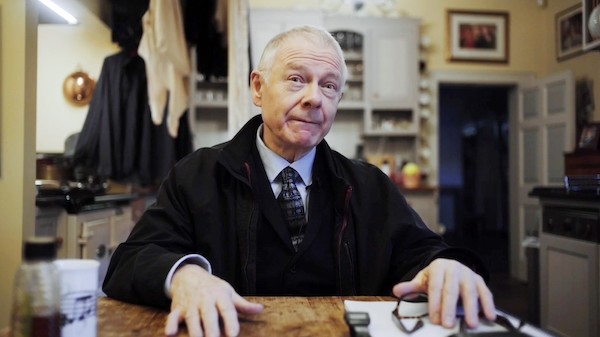Film Review: “In the Court of the Crimson King, King Crimson at 50” — Dreams and Nightmares
By Paul Robicheau
Surprisingly, for a band whose hypnotic music throughout the documentary provides a continuum with menacing and meditative extremes that mesh with near-mathematical discipline, it’s the human elements that leave the greatest impressions.
In the Court of the Crimson King, King Crimson at 50, directed by Toby Amies. The documentary will be released in theaters worldwide for a one-day-only event on October 19 with a specially filmed introduction, followed by a special VIP event livestreamed worldwide on October 22 on nugs.net and available by Video On Demand, with live introduction by Robert Fripp and Q&A with the director and band members. Link to theatrical screenings.

A scene featuring Robert Fripp in In the Court of the Crimson King, King Crimson at 50.
People may consider King Crimson the “dream band” that can do anything, as ex-drummer Bill Bruford explains in a documentary that marks the pioneering prog-rock outfit’s 50th anniversary. But Crimson also conjured nightmares for former members. Two left in the first year. Guitarist Adrian Belew says the group made his hair fall out. Percussionist Jamie Muir likens it to trying to play in a “storm.” Saxophonist Mel Collins, who took a 40-year break, says his first round in the band provided “a bit of a trauma” where you “got glowered at if you made a mistake. Some of us went through hell.”
In the Court of the Crimson King, King Crimson at 50 primarily traces that turmoil back to guitarist Robert Fripp, the band’s glowering taskmaster and sole constant since the early ’70s. As filmmaker Toby Amies trails the group on pre-pandemic tours, Fripp pointedly informs Amies that his interviews affected his playing the night before. He also fusses when travel logistics scuttle his fastidious practice regiment, equating it to athletes who need to do their daily calisthenics.
Interviews with Fripp and a baker’s dozen of past and current Crimson members (the latter mostly around soundchecks) form the backbone of this documentary, framing the band within those accounts and eschewing outside talking heads or much historical context. Non-fans will glean just enough to put it all together and likely be intrigued by Crimson’s interpersonal dynamics, which reflect the tension and flow of the music in a band that went through more than 20 members over the years.
The documentary doesn’t show complete performances (the closest being a one-minute climax of “Starless” beyond the artfully spun voiceovers). Yet Amies neatly weaves bits of 28 songs into the mix to illustrate the tale, drawing on tracks both live (mainly from rehearsals and ’70s TV footage) and from studio originals. He rounds the bases with a few scenes from striking concert venues (which include Pompeii and London’s Royal Albert Hall) and interviews with religiously fervent fans – including a Norwegian nun.

A shot of the crowd at a King Crimson concert. Photo: Tony Levin.
But Amies’ participatory chats with various band members — both about the music and the inner-band politics — dominate. Singer/guitarist Jakko Jakszyk, hooked on Crimson as a pre-teen because it seemed to come from “another planet,” shares drummer Gavin Harrison’s joke that “You’re irreplaceable, just like the last bloke.” Belew, smarting from not being invited into the latest incarnation, says Fripp is happiest with the new lineup because it goes his way. If not, Belew says, “he will take his guitar and go home.” Jeremy Stacey, another one of the current group’s three drummers, offers, “I actually like some major hard-ass making it as good as it can be.” And sax veteran Collins comes full circle to say he now finds the band “a pleasure,” noting Fripp apologized to him for being mean in the ’70s. “He’s mellowed, and he’s a nice person,” Collins says. “He had his own battles.”
Fripp did find solace in a ’70s retreat at spiritual academic J.G. Bennett’s academy, where he related to the line “If you have an unpleasant nature and dislike people, it is no obstacle to work.” Yet Fripp still flashes his edgy eccentricity in the film. When the music isn’t working, he says, “It’s like my mother has died, and where that’s come about because of a musician’s egotism, I am angry.” And, in the film’s only indulgent misstep, we watch Fripp’s face freeze as he pauses a story about meeting Bennett for an interminable nearly two minutes before concluding, “Mr. Bennett said ‘I will remember you.’”
The 86-minute film also spends extra time with and pays tribute to keyboardist/drummer Bill Rieflin, who finds grace and purpose in continuing to tour in King Crimson despite “constant pain” from stage 4 cancer. “Time stops,” he says in voiceover to footage of him playing a delicate keyboard soliloquy. “There’s just this one moment that you’re a part of.” When Rieflin passes at age 59, Fripp describes his only “personal friend” to join the band as “irreplaceable.” But the guitarist, who’s in his mid-70s, contends that he isn’t afraid of dying, and notes that “consciousness is a continuum.”
Surprisingly, for a band whose hypnotic music throughout the documentary provides a continuum with menacing and meditative extremes that mesh with near-mathematical discipline, it’s the human elements that leave the greatest impressions.
Tagged: In the Court of the Crimson King, King Crimson, King Crimson at 50, Paul Robicheau, Robert Fripp, documentary

I enjoyed the film greatly. I also thought Fripp’s long pause was indulgent nonsense – until after about a minute I noticed there were tears rolling down his cheeks and he was obviously battling to control his emotions before speaking again.
Good eye on your part. Clearly a very emotional memory for Fripp — and perhaps in keeping with his personality to restrain himself so much before giving such a composed response. As powerful as the moment was (at least for those who notice that he’s actually crying), it was at least an indulgent choice by the director to include it in a film just over 80 minutes long without credits.